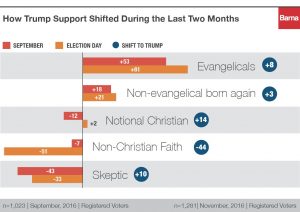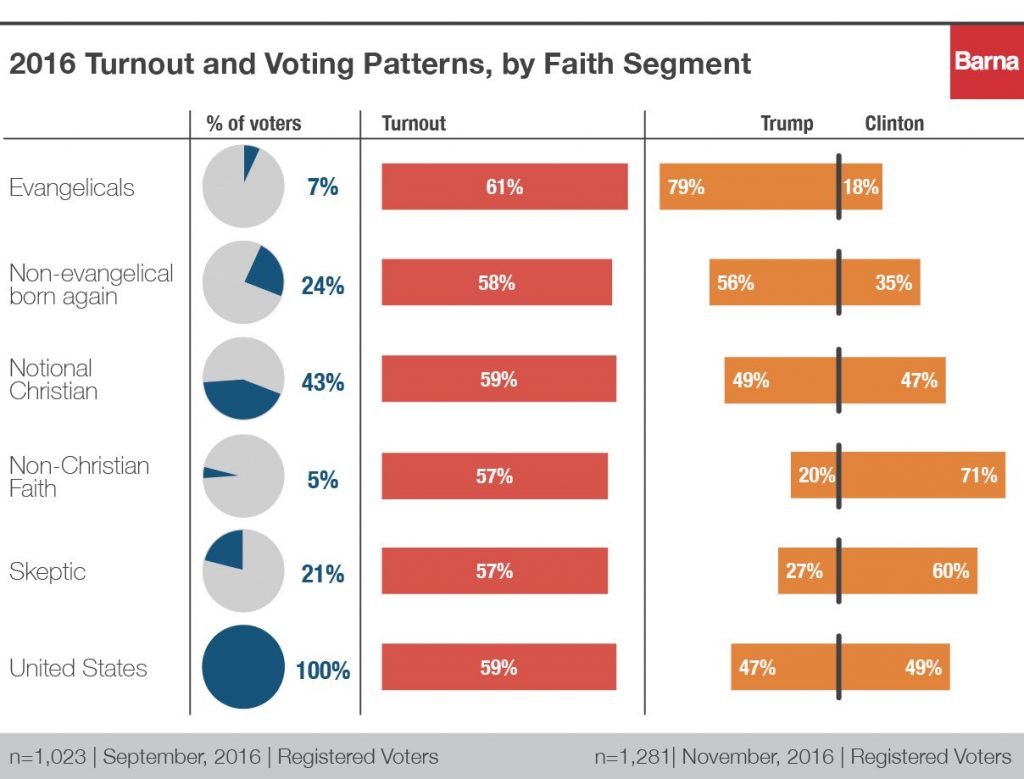The Barna Group is a conservative research company which has made a point of following the religious aspects and significance in US politics and election campaigns. The chief analyst was George Barna for the 2016 election polling. The Barna estimate for the 2016 election is that just under 59% of eligible voters participated.
Folks in the US were shocked when Donald Trump was elected. His supporters were jubilant and exhilarated that he had actually won. Hillary Clinton’s supporters were dumbfounded and devastated that she had lost. The results were not what had been predicted. News analysts were perplexed at how wrong they were. The Barna Group’s data has broken voters into 5 faith categories; Evangelical Christians (see strict definitions below), non-Evangelical born again Christians, Notional Christians, Other faiths and Skeptics; agnostics, atheists and folks who profess no faith.
The poll results showed that all three of the Christian faith groups were close in their turnout of eligible voters for the election; 61% for Evangelical Christians, 58% for non-Evangelical born-again Christians and 59% for Notional Christians. The other two faith groups were slightly lower in their turnout with both the Other faiths and the Skeptics, coming in at 57%. The size of these groups is vastly different and the number of votes each group provided are as follows;
- Evangelicals = 10 million votes
- non-Evangelicals = 33 million votes
- Notional Christians = 58 million votes
- Other faiths = 7 million
- Skeptics = 28 million
Majorities of the three Christian categories voted for Donald Trump as opposed to Hilary Clinton;
- Evangelicals, 79% for Trump vs 18% for Clinton
- non-Evangelicals, 56% for Trump vs 35% for Clinton
- Notional Christians, 49% for Trump vs 47% for Clinton
Majorities from the other two categories voted for Clinton;
- Other faiths, 71% for Clinton vs 20% for Trump
- Skeptics; 60% for Clinton vs 27% for Trump
Donald Trump garnered just 2% of the Notional Christian vote over Hilary Clinton; 49% vs 47%. But this was the first time since 1996 that the GOP candidate received the majority of the Notional Christian votes. Unfortunately for Clinton, who had a large percentage lead over Trump in the final stretch for the campaigns, a significate number of Notional Christians abandoned her in the last two months. Because the Notional Christians are the largest group by far, that proved to be a game changer for the election of Donald Trump. As a side note, this was the first campaign in 20 years where the Democrat didn’t come away with the Catholic vote. This year it was split 48% to 48%. The Protestant vote sided with Trump at 58% and Clinton only receiving 36% of that vote.

When the Barna Group compared the results of polls taken in SEP 2016 to NOV 2016, Hilary Clinton led Donald Trump in the Notional Christian vote by 12 percentage points in SEP. But by NOV, a giant switch had taken place and Clinton lost a full 14 percentage points to Trump as can be seen in the 49% Trump vs 47% Clinton voter results! The Skeptics category also changed in that last two months, from 43% in favor of Clinton, to just 33% in favor by Election Day.
There has been no discussion about the fact that the skeptic vote really kept Hillary Clinton in the race. The 33-point margin she retained with that one-fifth slice of the voting population was her primary faith base. The size of the skeptic population continues to grow while the born again community continues to shrink. That is a trend that will be a major challenge for conservative and Republican candidates in the future.
– George Barna
The groups defined – None of the people in the sample classified themselves into these five faith categories. Based on their answers to specific questions they were classified by the polling personnel.
Evangelicals met nine specific theological criteria.
- have made a personal commitment to Jesus Christ that is still important in their life today
- their faith is very important in their life today
- believe that when they die they will go to Heaven because they have confessed their sins and accepted Jesus Christ as their Savior
- strongly believe they have a personal responsibility to share their religious beliefs about Christ with non-Christian
- firmly believe that Satan exists
- strongly believe that eternal salvation is possible only through grace, not works
- strongly agree that Jesus Christ lived a sinless life on earth
- strongly assert that the Bible is accurate in all the principles it teaches
- describe God as the all-knowing, all-powerful, perfect deity who created the universe and still rules it today.
Non-evangelical born again Christians
- they have made “a personal commitment to Jesus Christ that is still important in their life today”
- believe that when they die they will go to Heaven because they have confessed their sins and accepted Jesus Christ as their Savior.
- they do not accept all of the remaining seven conditions that categorize someone as an evangelical.
Notional Christians
- people who consider themselves to be Christianhave
- have not made “a personal commitment to Jesus Christ that is still important in their life today,” OR
- do not believe that when they die they will go to Heaven because they have confessed their sins and accepted Jesus Christ as their Savior.
Other faith
- individuals who associate with a faith other than Christianity.
- most common of those faith groups included within that segment were Judaism, Islam, Buddhism and Hinduism.
Skeptics
- individuals who describe themselves as atheist or agnostic, or who indicate that they do not believe in the existence of God or have no faith-related ties or interests.
The full analysis can be read and the graphs observed on the Barna website.

